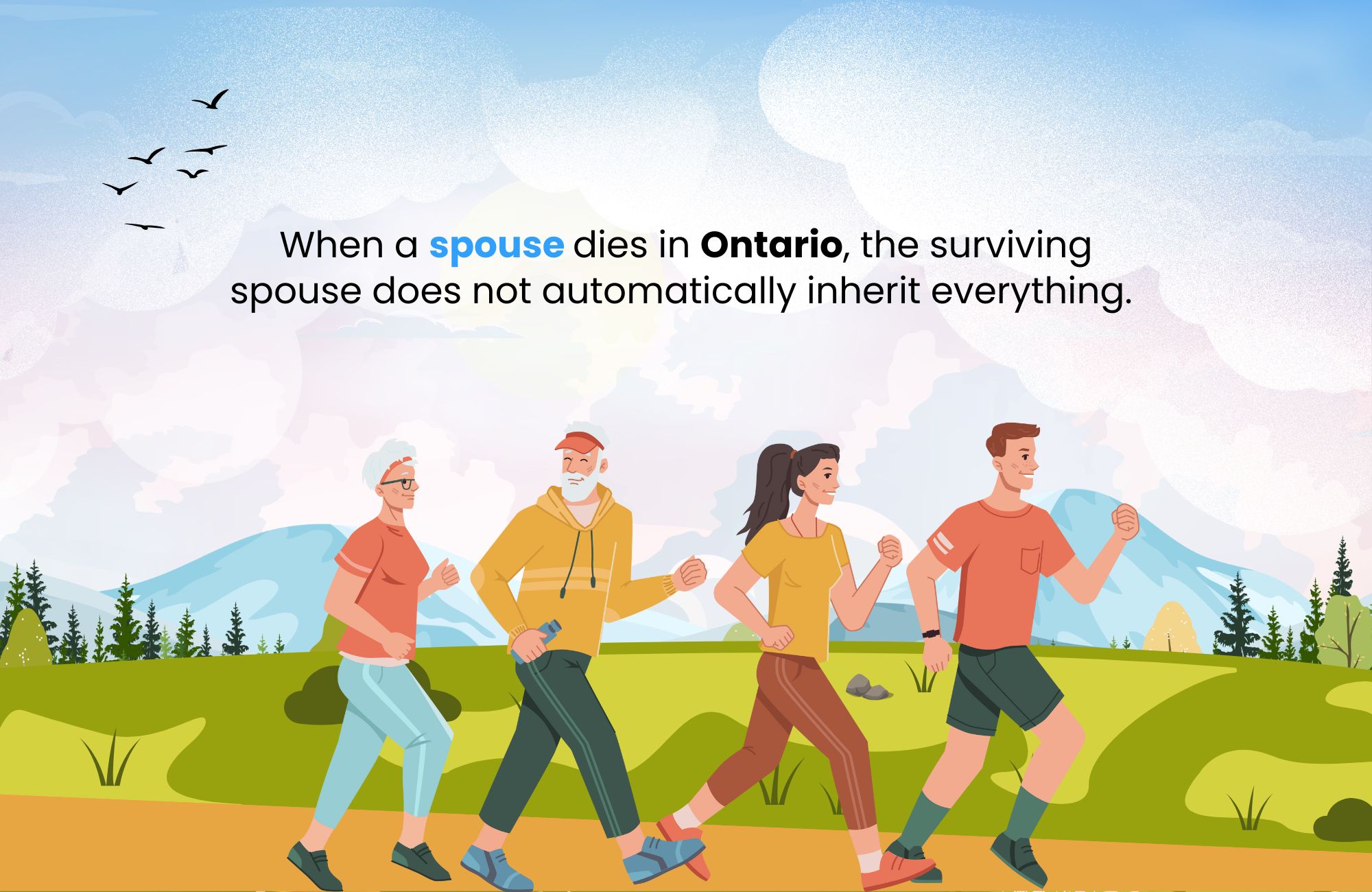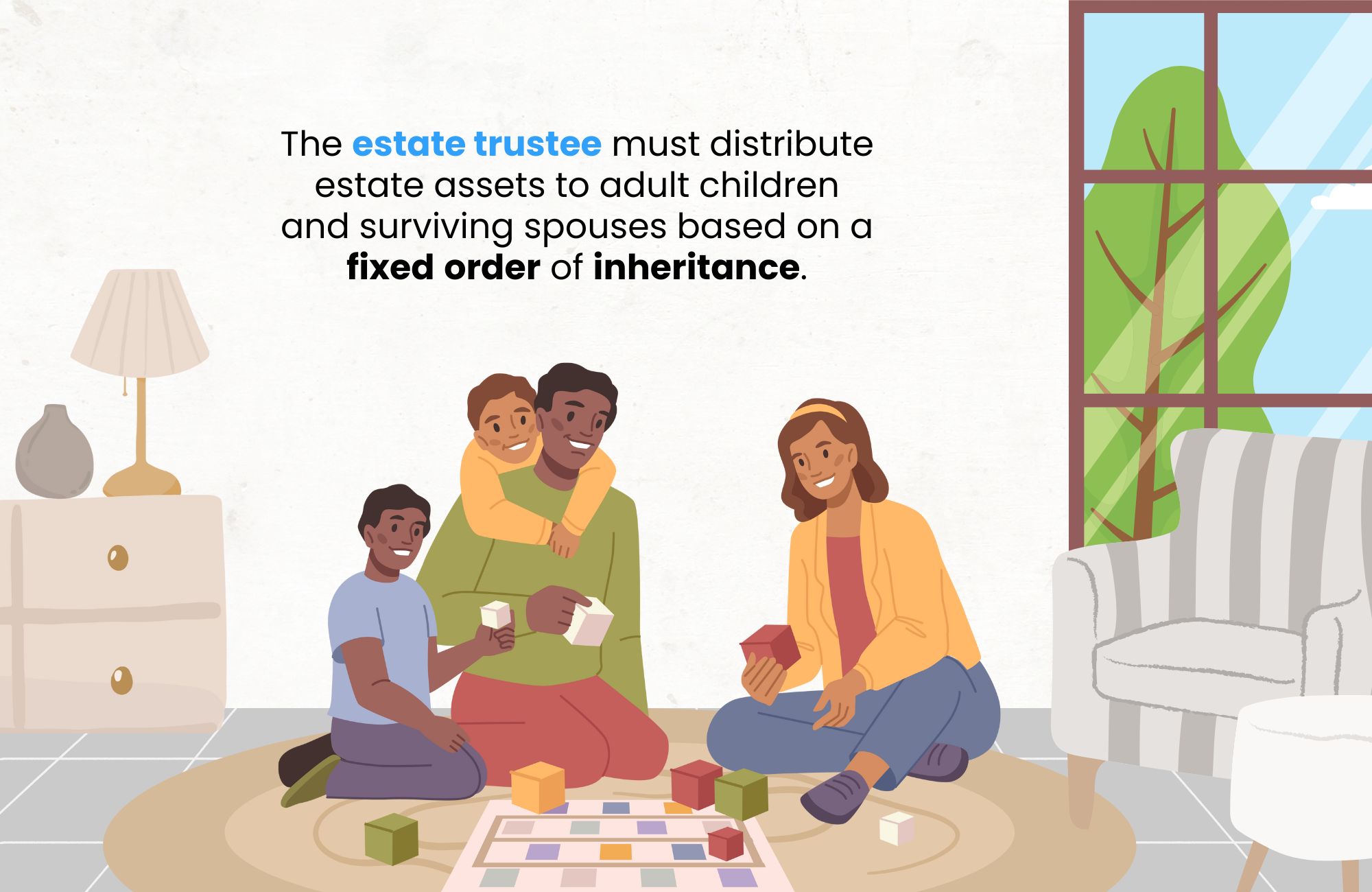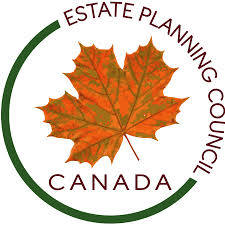Written by Ron Cooke, President & Founder of Strategic Wealth Protection Partners in Ontario, CEA®, Member of the Estate Planning Council Canada
Does a spouse automatically inherit everything in Ontario?
In Ontario, a spouse does not automatically inherit everything if their partner dies without a will.
If there is no will, which is called dying intestate, the law sets out who gets what under the Succession Law Reform Act (SLRA).
The surviving married spouse is entitled to a set amount first, which is called the preferential share. Currently, they are entitled to $350,000. If the estate is worth more than that and there are children, the rest is split between the spouse and the children.
How it’s divided depends on how many children there are. This only applies to legally married spouses.
Common-law partners do not automatically inherit under intestacy laws in Ontario. Also, if there is a valid will, the estate is distributed according to that document, which may or may not leave everything to the spouse. Having a proper will in place is important if you wish to ensure your wishes are followed.

According to a recent study by the Angus Reid Institute, half of Canadians say they don’t have a last will and testament.
Even among Canadians who are over age 55, one-in-five haven’t made a will. If you live in Ontario and are married, having a will is critical.
Without a will, your death could lead to some unintended financial consequences for your spouse.
Summary of Key Points
- In Ontario, a spouse does not automatically inherit everything when their partner dies.
- Without a will, Ontario’s Succession Law Reform Act decides who gets what, and the estate may be shared with adult children or other relatives.
- The preferential share for a surviving married spouse is currently $350,000. Anything above that may be split.
- Common-law partners are not automatically entitled to inherit anything without a will.
- A properly written will ensures your estate assets go to the people you choose, and can help reduce estate administration tax and delays.
- If you have children, own property, or want to protect your spouse, you need a will to avoid unintended consequences.
- A will is NOT the same as a comprehensive estate plan, which includes tax planning strategies designed to ensure your family keeps more of their inheritance.
How Does Spousal Inheritance Work in Ontario?
When a spouse dies in Ontario, the surviving spouse does not automatically inherit everything.
If there is a valid will, the will governs who receives what. If there is no will, Ontario’s estate laws apply through intestate succession. Married spouses have specific legal rights that protect them, while common-law partners are treated differently.
The outcome depends greatly on whether proper planning was done before death, and whether the deceased’s estate is passing under a will or without one.

How Does Marriage Affect Inheritance Rights?
Being legally married in Ontario gives a surviving spouse powerful rights under the Family Law Act and Succession Law Reform Act.
A surviving parent can choose between receiving what is left to them in the will or electing to receive an equalization payment of property as if the marriage ended in divorce.
This legal protection ensures that married spouses are not left without support, even if the deceased’s estate plan was poorly prepared.
Read More: What Is a Living Will in Canada?

What Happens When You Die Without a Will in Ontario?
Dying without a will is called dying intestate, and Ontario law sets strict rules for who inherits in that case.
The estate trustee must distribute estate assets to adult children and surviving spouses based on a fixed order of inheritance.
For example, a spouse may be entitled to the first $350,000 of the estate plus a share of the remainder with the children. Without a will, the process can create delays, conflict, and added cost for the family.
What Are Common-Law Partners Entitled to in Ontario?
Unlike married spouses, common-law partners do not automatically inherit the deceased’s estate under Ontario law.
They cannot claim a share of estate assets unless they are specifically named in a will, jointly own property, or are designated as a beneficiary on accounts or insurance.
However, common-law partners can make dependent’s relief claims if they were financially dependent on the deceased, but this process is complex and uncertain.

Why Every Ontario Couple Needs a Will and an Estate Plan
A will is essential, but it is not enough on its own.
Without a will, estate assets may be divided by law in ways that do not match your wishes, leaving adult children or a surviving parent in disputes. More importantly, a will is only one part of an estate plan.
A proper estate plan addresses taxes, probate, trusts, beneficiary designations, and strategies to minimize estate administration tax and preserve wealth.
Couples who plan ahead can save their families from stress, conflict, and unnecessary taxes payable.
Read More: How to Write a Will in Ontario
What Happens to Jointly Owned Property When a Spouse Dies?
Jointly owned property with right of survivorship passes directly to the surviving spouse outside the deceased’s estate.
This means that real estate, bank accounts, or investment accounts held jointly usually transfer automatically, avoiding probate.
Beneficiary designations on registered accounts and life insurance also allow assets to bypass the estate and go directly to the spouse or children.
This is why careful planning of ownership and beneficiary designations is so important.

How Does Divorce or Separation Affect Estate Rights?
When a marriage ends in divorce, a former spouse generally loses rights to inherit under a will unless specifically named.
Separation creates a grey area because until a divorce is finalized, a separated spouse may still have claims against the deceased’s estate.
Remarriage can also revoke a will, which means estate assets may be distributed in unexpected ways if a new will is not prepared.
These life changes should always trigger a review of estate planning.
Read More: A Guide to Wills for Blended Families in Canada
How Can I Write a Will in Ontario?
Writing a will in Ontario is not the same for everyone.
Someone with $100,000 in assets may have a straightforward will that ensures their spouse or children receive their estate assets smoothly.
Someone with $5 million or more needs careful planning to account for estate administration tax, trusts, capital gains, and strategies to protect assets for adult children.
The complexity of your estate should guide who you work with and what tools you use to protect your legacy.

Common Questions
Does the wife get everything when the husband dies in Ontario?
Not always. If there is a valid will, it controls the distribution. Without a will, estate laws apply.
Does a spouse inherit the entire estate in Ontario?
A married spouse may inherit the whole estate if there are no children. If there are children, the estate is shared.
What is the order of inheritance in Ontario?
Ontario law gives priority to the spouse first, then adult children, followed by other relatives if no immediate family exists.
Does your spouse get any of your inheritance?
Inherited property is considered separate, but if used for family purposes or co-mingled, a spouse may have a claim.
Who acts as the estate trustee if there is no will?
If there is no will, the court appoints an estate trustee, usually the surviving spouse or a close family member.
Discover How to Minimize Taxes and Secure Your Legacy
Did you know that without a solid estate plan, taxes and fees in Ontario could claim a significant portion of your wealth?
If you’ve worked hard to build your business, investments, and properties, protecting your legacy for your loved ones is critical. At Strategic Wealth Protection Partners, we specialize in helping high-net-worth individuals in Ontario secure their financial futures.
Our Living Estate Plan is designed to:
- Reduce estate taxes and probate fees.
- Simplify wealth transfer to your loved ones.
- Reflect your values and priorities in every detail.
Your Legacy Matters
With our personalized guidance, we’ll help you navigate options like Living Trusts to protect your assets and ensure your family’s peace of mind. Contact us today to book your Living Estate Plan Consultation and take the first step toward a secure future.
Schedule a Living Estate Plan Consultation
Planning your legacy is about more than numbers—it’s about ensuring your family remembers you and your values are honoured for many years to come.
Estate planning and trusts can feel overwhelming, especially if it’s your first time. That’s why we’re here.
With our simple, 5-Step Living Estate Plan, we make the process easy, helping you create a comprehensive estate plan or trust that protects your assets from taxes and probate fees while preserving your legacy. Tools like The Final Word Journal capture your story, wishes, and essential details like accounts and end-of-life plans, ensuring your family has clarity and comfort.
Take the first step today—schedule a consultation call and give your family the ultimate gift: peace of mind and the assurance they were always your priority.
Read More
If you’re starting your estate planning process, you may find these articles helpful:
- Case Study: How Bill Protected His Children’s Inheritance with a Trust
- Is Inheritance Taxable in Canada?
- Inheritance Tax Ontario: Everything You Need to Know
About the Author
RON COOKE, PRESIDENT & FOUNDER OF STRATEGIC WEALTH PROTECTION PARTNERS

With over 30 years in financial services, I’ve seen the challenges families face when a loved one passes—lost assets, unnecessary taxes, and emotional stress. That’s why I created the Living Estate Plan, a comprehensive process to protect assets, eliminate estate and probate fees, and create legacies that are remembered for many years to come.
This plan ensures your family receives not just your wealth, but a meaningful reminder of your care and love. Tools like The Final Word Journal capture your story, wishes, and essential details, offering clarity and comfort during difficult times.
Your final gift should be more than money—it should be peace of mind, cherished memories, and an organized estate.
Schedule a Call
Schedule a 30-minute consultation call with Strategic Wealth Protection Partners.
Click HERE to schedule a consultation.









